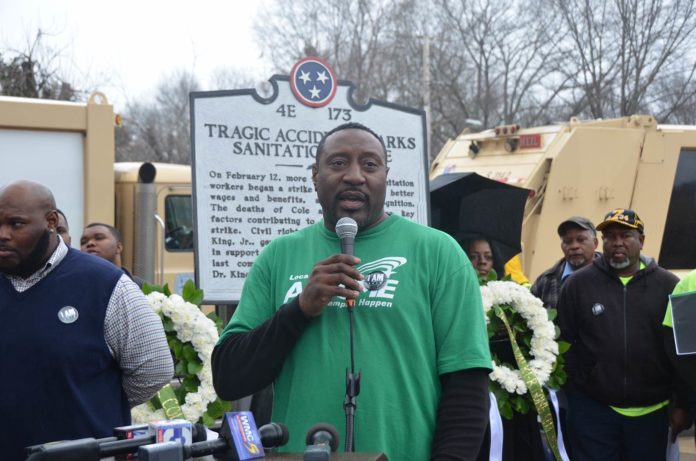The nation’s “drum major for justice” interrupted his Poor People’s Campaign in 1968 to join the city’s public works employees in a strike for higher pay and more humane working conditions.
Dr. Martin Luther King Jr.,who declared that he was “not fearing any man,” because he had “been to the mountaintop,” made his last stand on that famous Lorraine Motel balcony.
Nearly 100 percent of the AFSCME Local 1733 strikers declared before the world, “I Am A Man.” Their grievances were just, and to improve conditions was the right thing to do. Half a century later, the union is in negotiations and has deep concerns.
“For nearly a decade, the city has been trying to privatize the Sanitation Department,” said Maurice Spivey, Memphis chapter chairperson. “This is the only job in the world that has Dr. King’s blood on its hands. Privatization would take away everyone’s job and the benefits we’ve worked so hard for. It’s like we’ve never even moved from that time.”
The Rev. Cleo Smith, who marched with King, is still on the job today at 75.
“I thank the Lord that I’m still strong enough and able to work,” said Smith. “You see, we don’t have a retirement plan. So I’m still fighting for three things before I retire from the job. We want these young people not to have to walk the same hard road we had to walk.”
Smith said the city has hired a large number of temporary workers who have been on the job for 1-5 years. They have no benefits, and they can’t take care of their families properly.
“A young man who was a temp recently died. He had been working as a temp for five years, and he had no benefits,” said Smith. “This practice is unfair, and we want to see it stopped. Everyone should have benefits.”
Also, Smith said the workers have not had a raise in nine years. ”This is unjust.
“The third thing is that back when we had light snow, we drove in to work anyway,” he said. “Our location decided to stay there in the building to see if conditions would improve so that we could go out and do our job. Conditions did improve, and we did our routes that day. But at the North Bellevue plant, those workers were not allowed to wait. They were ordered to ‘leave the premises.’ They did not leave, so the police were called to remove them.”
“Things like that continue to happen, even in 2017 and 2018,” said Smith. “This is why I can’t retire. We have to leave things better for the young ones coming up after us.”
Spivey, who is at the negotiating table for his more than 900 workers, is optimistic, but observed that some people’s attitudes toward sanitation workers have not changed.
“We are still 98 percent black,” said Spivey. “And as black men and women, our contributions are not valued. Some people, if they could dig Dr. King up, put him back on that balcony, they would kill him all over again.”
“Under fire once more is our ‘Incentive Plan.’ The Incentive Plan is an important safety measure, and I am convinced it has saved lives,’ he said. “This clause allows workers who complete their route before the 8-hour shift is up, to get off early, but still be paid for eight hours.”
Spivey said what sanitation workers do is heavy work and that fatigue is a major factor in accidents.
“We will continue to stand against privatization, and we will insist on maintaining the Incentive Plan,” he said. “Our position has crystallized relatively early in the negotiating process. It’s been 50 years since we began this fight, and it is far from over.”
Rev. Smith said he will stay there on the job as long as the Lord helps him. He desires to make a difference.
“Back there in 1967 and ’68, the conditions were just so deplorable. The stench was unbearable. That garbage would be crammed in those 50-pound drums,” he said. “And I heard the Lord say, ‘Just hold on. It’s gonna get better.’ A still voice spoke that to me, just as sure as I’m sitting here.
“It took 30 years, but things did get better. We were getting raises, joining the credit union, and getting new work equipment in. Now, 20 years later, we’re right back where we started. Fighting for our jobs against privatization and fighting to keep our incentive plan for job safety.
“As God helps me, I’m staying right here on this job, and we won’t stop working until things are good again,” he said. “The 50th anniversary of Dr. King’s assassination is a good time for recommitting.”



